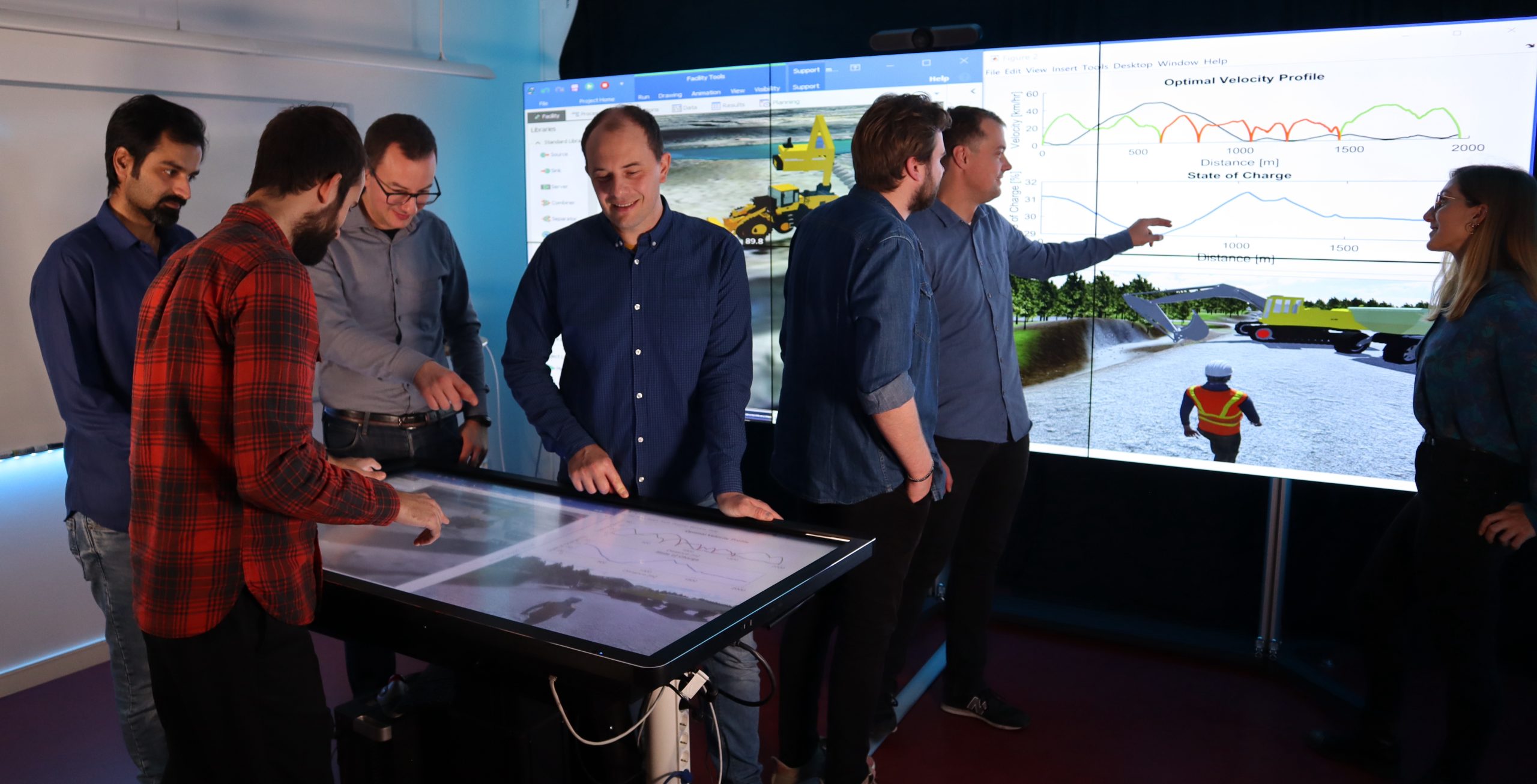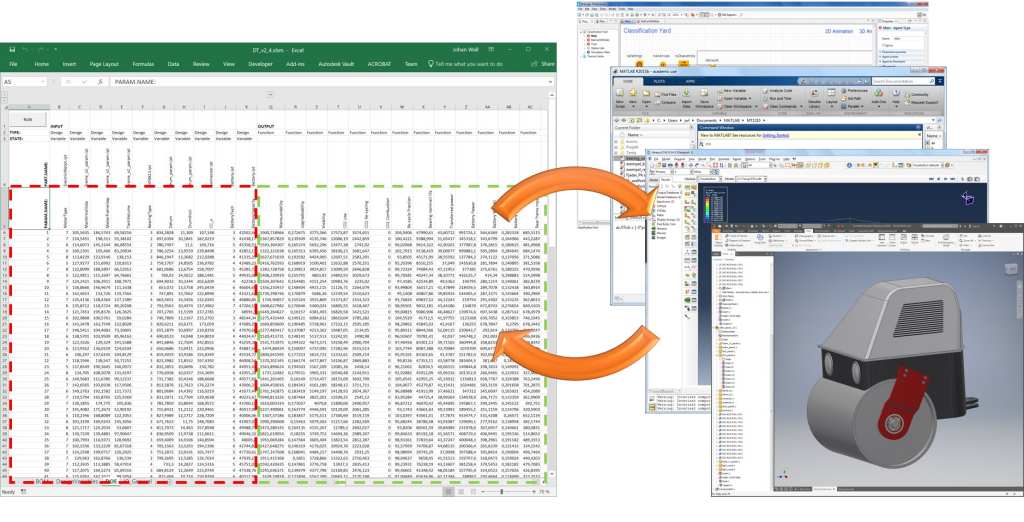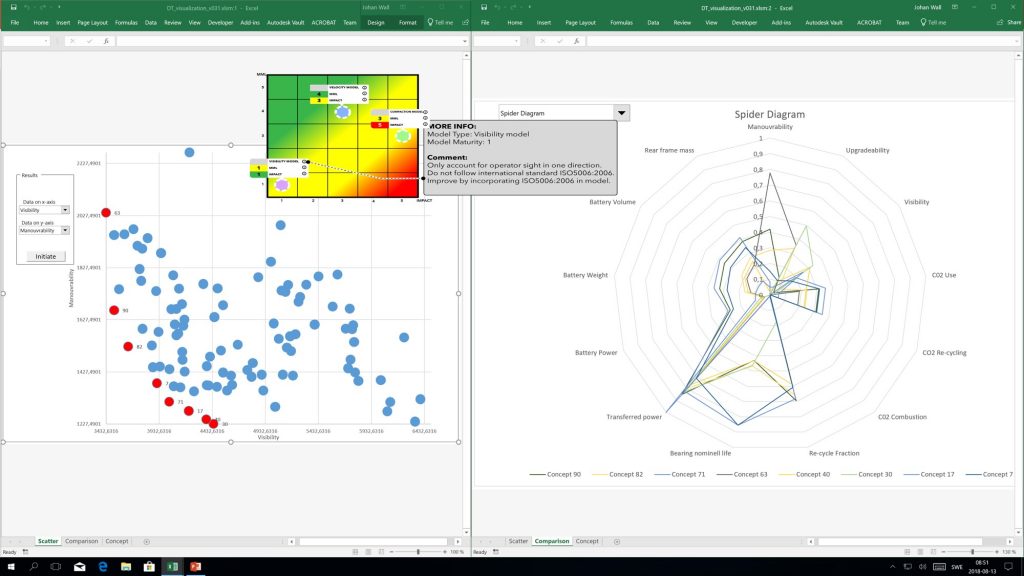
Model Driven Decision Arena – MDDA
- Post by: Tobias Larsson
- 2nd September 2018
- 6 Comments
One success factor in engineering design is the ability to make effective and risk-managed decisions in a timely manner. Rarely is a single person sufficient to resolve today’s complex, connected issues. Rather, a group of stakeholders possessing required expert knowledge needs to be enrolled as these issues normally requires a wide variety of expert competences, transcending traditional disciplines. Where this previously was a question of being able to resolve trade-offs regarding design and development of the pure physical artefact it is now a complex ambiguity game involving all disciplines touching a solution during its lifecycle, due to the movement towards integrated product-service solutions. Hence making the problem even more pronounced.
This challenge is tackled in ongoing research within the project Model Driven Development Decision Support (MD3S) at the Product Development Research Lab (PDRL) of Blekinge Institute of Technology (BTH). The hypothesis of this research is that the ability to gather this normally diverse group of stakeholders (domain experts) in a collaborative setting, encompassing a broader representation of knowledge and values in decision scenarios, will augment decision making ability in early design.
The proposed solution is a model-driven environment for collaborative decision making, a Decision Arena (Model Driven Decision Arena – MDDA). In the Decision Arena the stakeholder group interact with each other using models to generate and gather relevant data for the problem at hand. By communicating, sharing knowledge and values aided by data analysis and visualization constructs that provide capability to understand, contrast and compare, the group transform data into knowledge.
Turning data into knowledge is the currency of the future!
The team evaluates design proposals and navigates through the often vast design space by playing out potential usage scenarios and investigating cause and effect relationships. This experimentation is done by manipulating models through graphical user interfaces, enabling also non-expert to actively participate. This intended human-in-the-loop decision scenario allows to embrace the design by shopping paradigm to design. The ability to not only generate data but also analyse and finally present it in graspable ways are crucial.
-The ability to turn data into knowledge is the currency of the future says Johan Wall, project manager for the Decision Arena.
-The Decision Arena is a digital war room for model-driven design says Johan Wall. The setup of the room is intended for collaborative activities for groups of three to six individuals although the room itself could accommodate at least 10 individuals in a presentation session. Elements of the room are furniture, whiteboards, a large multi-touch screen, a computational server and a video wall intended as canvas for displaying a variety of items such as concept descriptions, models and simulation results.
The Decision Arena is a digital war room for model-driven design…
The intended process is model-driven, i.e. work practice and interaction is centred around the use of digital models, model generated information, simulation data and product data collected in the field. In the room design proposals are evaluated by playing out potential usage scenarios and investigating cause and effect relationships building a shared understanding of the task at hand.
Work on conceptualizing, developing, and testing the Decision Arena is done through several cases from different industry sectors in Sweden.

Through the successive implementation of new industrial cases a generic simulation scheme based on Value-Driven Design (VDD) has evolved. VDD uses a single objective function, as so-called value function, to measure the “goodness” of the design. As indicated by the figure below, VDD aggregates the multidisciplinary models of function and cost, evaluated by adding business and contextual data, into a ‘value model’. More on VDD in general and research conducted by the PDRL team in particular can be found here.
“- The Decision Arena is our main vehicle for deploying research findings, it’s in here our research streams converges”, says professor Tobias Larsson. The development of the Decision Arena is ongoing and will be one of PDRLs main research focuses the coming years.
Publications
More details about the environment and the test cases can be found in following research publications:
- Aeddula, O., Wall, J., & Larsson, T. (2021). ARTIFICIAL NEURAL NETWORKS SUPPORTING CAUSE AND EFFECT STUDIES IN PRODUCT-SERVICE SYSTEM DEVELOPMENT. Design for Tomorrow—Volume 1 : Proceedings of ICoRD 2021, I. https://doi.org/10.1007/978-981-16-0041-8
- Wall, J. & Bertoni, M. (2020). The Decision Arena: A model-centric interactive workspace for Product-Service System design, Proceedings of NordDesign 2020, Lyngby, Denmark, 12th – 14th August 2020, https://doi.org/10.35199/NORDDESIGN2020.37
- Wall, J., Bertoni, M., & Larsson, T. (2020). The Model-Driven Decision Arena: Augmented Decision-Making for Product-Service Systems Design. Systems, 8(22). https://doi.org/10.3390/systems8020022
- Wall, J., Aeddula, O., & Larsson, T. (2020). Data analysis method supporting cause and effect studies in product-service system development. In DESIGN 2020 – 16th International Design Conference (Vol. 1, pp. 461–470). Cambridge University Press. https://doi.org/10.1017/dsd.2020.123
- Bertoni, M., G. Pezzotta, B. Scandella, J. Wall, P. Jonsson. (2019). Life cycle simulation to support cross-disciplinary decision making in early PSS design. 11th CIRP Conference on Industrial Product-Service Systems, Hong Kong, 29th-31st May, 2019
- Wall, J., Bertoni, M., Larsson, T. (2018). A model-driven decision arena: Augmenting decision making in early design, Norddesign conference proceedings, The Design Society, 2018.
- Syed, A.C. & Bertoni, M. (2018) Modelling resale value of compaction machines: a data mining approach. Special Session in Data-Driven PSS design at the INCOM conference 2018, Bergamo, June 13-14 2018.
- Bertoni, A., Dasari, S., Hallstedt, S., Andersson, P. (2018). Model-based decision support for value and sustainability assessment: applying machine learning in aerospace product development. International design conference (Design 2018). Dubrovnik, Croatia, May 21-24.
- Bertoni, M., Syed, AC., Bellini, A. (2018). Model-driven value assessment: a case from the packaging food industry. International design conference (Design 2018). Dubrovnik, Croatia, May 21-24.
- Bertoni, M., Wall, J. & Bertoni, A. (2018). Model-driven decision arena: An aerospace case study. International design conference (Design 2018). Dubrovnik, Croatia, May 21-24.
- Panarotto, M., Wall, J., & Larsson, T. (2017). Simulation-driven design for assessing strategic decisions in the conceptual design of circular PSS business models. Procedia CIRP, 64, 25-30.
- Johansson, C., Wall, J. & Panarotto, M. (2017). Maturity of models in a multi-model decision support system. In 21st International Conference on Engineering Design (ICED), Vancouver. The Design Society.
- Panarotto, M., Wall, J., Bertoni, M., Larsson, T., & Jonsson, P. (2017). Value-driven simulation: thinking together through simulation in early engineering design. In 21st International Conference on Engineering Design (ICED), Vancouver. The Design Society.
Contacts
- Professor Tobias Larsson
- Assistant Professor Johan Wall, project manager for the Decision Arena
- Professor Marco Bertoni
- Associate Professor Alessandro Bertoni
- Assistant Professor Christian Johansson Askling




6 Comments on “Model Driven Decision Arena – MDDA”
Comments are closed.